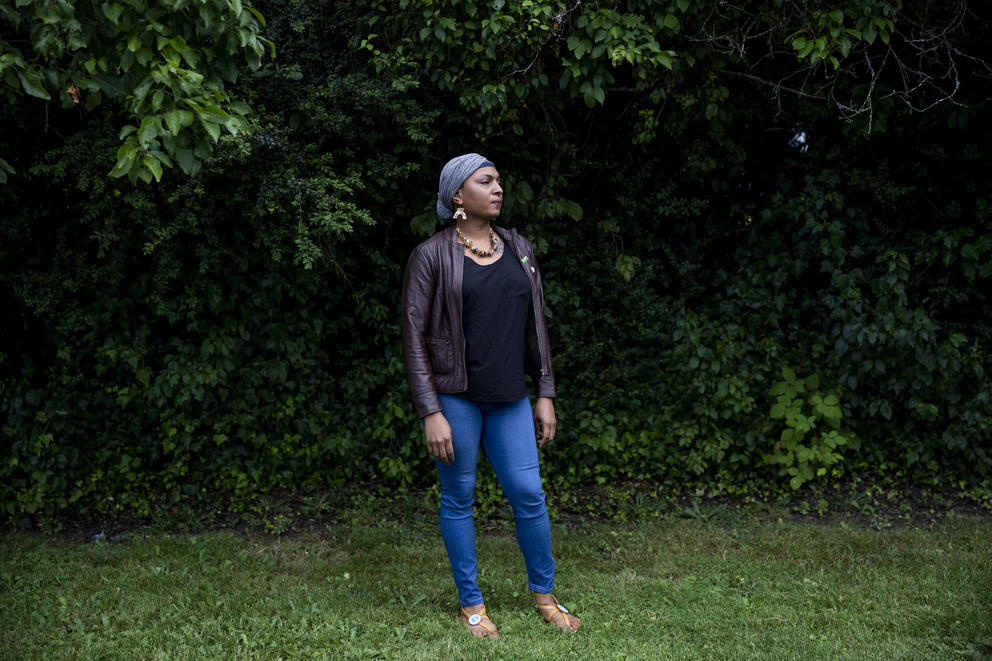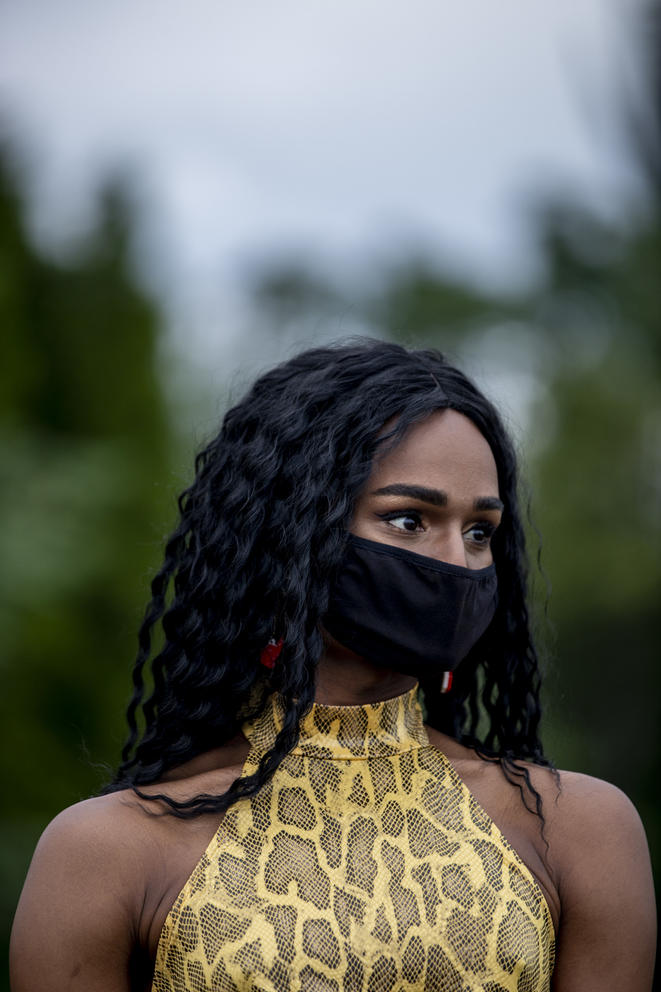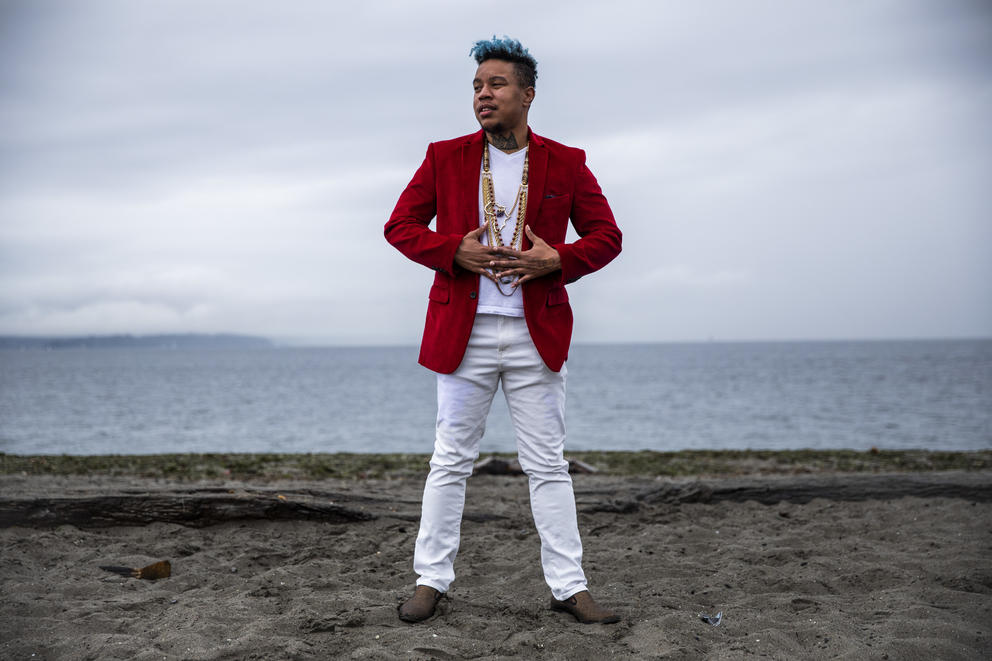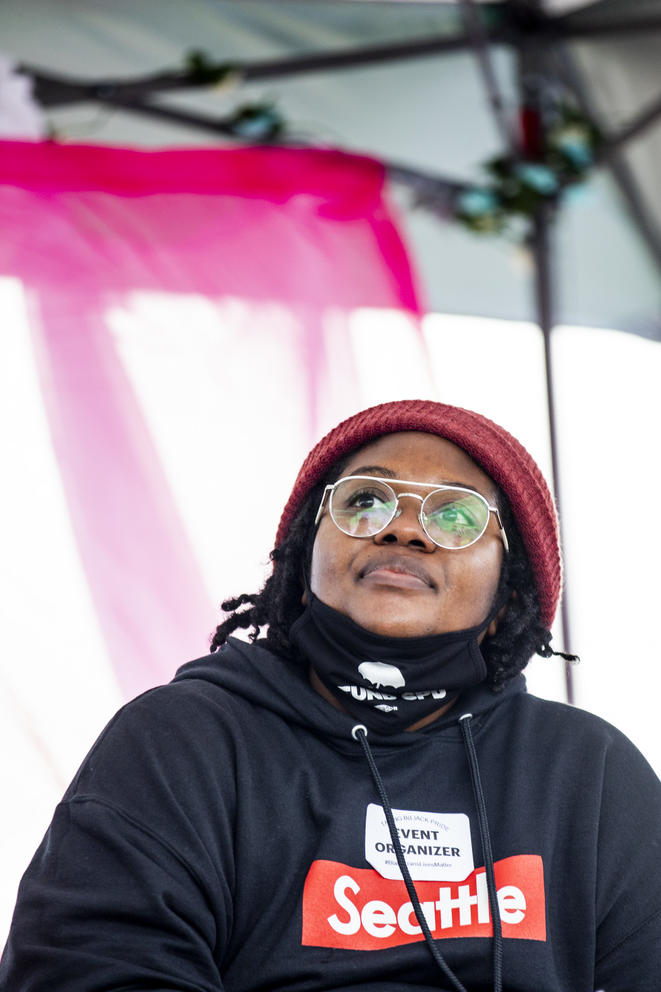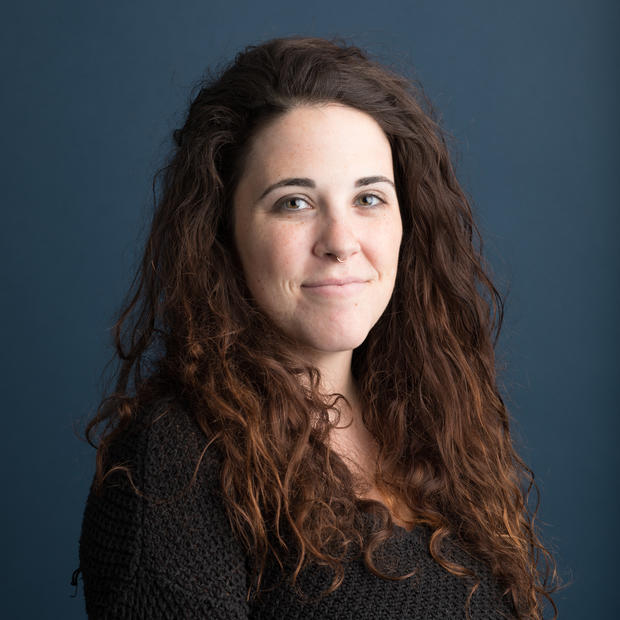Now, between Pride Month and protests centering on Black lives, these issues are in the spotlight again. Black trans activists have taken to social media and the streets, bringing attention in particular to the growing number of murdered Black trans women within their community.
For many who’ve criticized the commodification of Pride, it’s been a welcome shakeup. Crosscut spoke to four Black trans organizers who’ve witnessed and been part of this evolution. We asked how they’ve taken the energy behind the current moment and implemented it into their Pride plans — whether that means reimagining the month or abandoning the idea of it entirely.
These interviews have been edited for clarity.
Between protests and the pandemic, this year’s Pride Month has looked different. What have you been thinking about these changes?
Mattie Mooney, health care access manager at Ingersoll Gender Center and founding member of the Trans Women of Color Solidarity Network: In creating the Taking B(L)ACK PRIDE event, our goal was to tell our own stories. It was about letting trans folks know in our community and other communities that their lives and their experiences matter. We just got tired of waiting to be served at the table that we weren't even invited to — so we created our own table.
In the traditional movement around Black Lives [Matter], especially in Seattle right now, it is very cis male-centered. And I think that, especially with some of the recent events, we've seen that it's not just Black cis men who experience police violence. Black trans men do, Black trans women do, Black nonbinary folks do, in addition to many other groups.
Jaelynn Scott, interim executive director of the Lavender Rights Project and founding member of the WA Black Trans Task Force: [Black trans people] were on the ground from the beginning. We were the movers. We were the shakers of the movement. We were both the spark that lit the thing, and we were the fire that just kept it going. And somehow over the years trans women of color in general, like Sylvia Rivera, rapidly got booed offstage — eventually completely marginalized and pushed out.
In this current moment of insurrection in the larger Black community, we have continued to do the work that we've always been doing. We have continued to celebrate with each other, to do the organizing work, to yell and scream and cry about the murder of Black trans people. Pride for us has always been in the barbecues and the gatherings and the spiritual events with Black trans house mothers, where we have learned to celebrate who we are.
J Mase III, artist, organizer and founder of awQward: When we think about the livelihoods of black trans folks, a huge portion of us gets pushed out of 9 to 5 work every day, right? The act of being an artist is very common for us. And so I, like many other black trans folks, am a full-time artist. When the pandemic hit, that meant my whole tour schedule was cleared for the last few months. I definitely did not imagine in the year 2020 that I would be performing via computer. It really shifted the ways I had to think about my art.
Randy Ford, artist and founding member of AU Collective: I'm a member of a collective where we center people of color, women and queer folks. Since ’rona, since we're not performing, we've been trying to realize: How do we utilize the nonprofit status that we have? We’ve been providing relief funds for folks since the first few months when ’rona hit. And then recently, just through everything, we turned our efforts towards black trans people.
How have the protests influenced your approach to your work?
Scott: I feel like this moment has provided a certain amount of access and attention that has long been warranted. It's a little bit easier to speak to folks who have the ability to do some sustained change and funding for the movement. However, if they make decisions that we don't agree with that cause people to then ignore or de-center the concerns of Black people in this movement — which, in my opinion, has happened with CHOP — then that means we lose that political capital really quickly.
Mooney: I always tell people that you can tell a lot by a self-proclaimed leader or organizer by how they amplify the voices of the most marginalized amongst them. And in the CHOP/CHAZ area, I didn't see any of that. I would listen to people talk and there would be cis men shouting down Black women. There would be no conversations about Black trans women and what they face from the police. The Taking B(l)ack Pride event will be the only time in this movement in Seattle that Black trans folks have been centered and celebrated and have their voices amplified and experiences validated. So that's huge.
Mase: This to me, I think, is a great day of reckoning. And I'm really excited for a time in which resources can be reallocated to the people whose stories and labors have been consistently stolen for their profit. I think that the livelihoods of black trans and nonbinary people and brown trans and nonbinary people could greatly shift in the next few years as a result of some of the, not just Seattle things, but things that are going on globally.
Ford: I'm doing what I can just to remind my community that they're not alone, that I also feel them in this time. And right now everyone's like, "We need trans people at these marches. We need you." I'm like, "No, no, no, no, no. I've been doing this since before this pandemic happened, since before these marches happened. You're not going to run me tired just because you're finally getting some steam and using it." We ourselves can definitely be tokenized and exploited in our own movement. We need to take care of ourselves and protect ourselves.
What do you make of what seems to be a more mainstream attention towards trans issues, and even more specifically toward issues concerning Black trans women?
Mooney: In general, I think that our identities — the trans identity, the gay identity, the lesbian identity, the queer identity — they are always going to be more accepted when they're white. As much as transness is visible right now, I think that white transness is more accepted and more visible.
One of the most visible Seattle moments regarding that was with Beyonce Black St. James. In Seattle, it's fairly common to invite trans performers to your events, to raise the profile of your events, to be the MCs of your events, to perform at your events. And her career was essentially ruined over something that happens in Seattle literally every month. So I think that we are very conveniently used and then discarded when we no longer fit into the expectations or fit into the needs of whomever is exploiting our labor.
Scott: The story of trans people in general, but especially Black trans people in America, is one of erasure. When we are needed as entertainment, when we are needed as pleasure, when we are needed for a tool in a movement or some name recognition and for your street cred for being a liberal, then we are lifted. But the moment that the cisgender community is bored, we are erased again. We aren't allowed to stand up, be who we are and have it recognized, and we're really tired of it.
Mase: Representation, to me, when it comes to what's happening in media is not the end goal at any point, because representation does not lead to safety for many of us. But I know that seeing that representation means there's also some other things happening below the surface. Even to get to a Laverne Cox, hundreds of other Black trans people had to organize to make that possible. That means that there's a lot more coming.
Ford: You can only imagine how many times people ask me if I've seen Pose, or how many times people say that I remind them of Indya Moore, or how many times they ask if I can vogue. And so, yes, it's great that we are able to see [trans] people working and making a living. I think the [queer] babies seeing this growing up, they have a huge leg up on people who are my age or even older than me, who never had anything outside of Jerry Springer playing on TV.
I do think, though, that with people in general there's often a lack of wanting to expand beyond that. And so, I'm hoping that people are expanding beyond just [trans] people who have access to hormonal therapy. I hope people think beyond [trans] people who are "passing." [Being trans is] not just being born in the wrong body — some people actually love the body that they're in, but the world around them doesn't understand them and can't, therefore, digest anything that they are because they can't get beyond the body. There are many, many, many, many other ways to be trans, to be a gender variant person, to experience your transness, to express your transness, to hold, and honor, and center your transness.
After this year, what’s next for Pride? What should we keep and what should we leave behind?
Mooney: Honestly, I don't know. I know that for myself and perhaps for other Black trans organizers, I think that Pride could be reimagined in that we don't need to buy into Pride™ and that we can always create our own. We always have created our own.
Scott: It's a hard question because I'm so divested from Pride at this point. I hope Pride continues for one reason and one reason only: because it is a wealth of resources for Black trans folks in our organizations, so we can do fundraising around it. However, as far as any social justice affirmation reasons, we'll continue to do what we've been doing. And if we need a trans Black Pride, we'll create that. But I'm really personally less concerned about what Pride will or won't be in the future, just because it has not and never has represented me personally as a Black trans woman.
Mase: I'm not invested in holding on to Pride anymore. I think that, in its start, it was something beautiful and magical and now it is a Hallmark card. So we could lose it. I think lots of organizations need to liquidate their funds and actually just reinvest in the people. That would be Pride that I would celebrate.
Ford: It's funny — I used to go-go dance when I started off, and so Pride used to be one of my main modes of income, especially as a trans performer. But in recent years, I've grown very distant with Pride because of the constant erasure that Black trans femmes and nonbinary folks endure throughout the movement. It's been commodified. Capitol Hill loves its gay holiday, and there's no real remembering that poor, Black, trans, nonbinary, gender nonconforming folks started this shit.
We can also focus on trans people who don't want to be performers. Maybe they want to be a construction worker. Where's the representation for that? Why do we only have representation when it comes to performing and putting on a show? People really need to think about that, and think about why they only interact, maybe, with trans people in a performance setting.
Mattie Mooney, health care access manager at Ingersoll Gender Center and founding member of the Trans Women of Color Solidarity Network, during Taking B(L)ACK Pride in Jefferson Park on June 27, 2020. They helped organize the Pride event with the intention of centering Black trans and Black queer folks. (Dorothy Edwards/Crosscut)
What are some meaningful ways to support trans people of color?
Mase: Money, that's the number one way. There's a lot of trauma that we carry in our bodies and in our bones because we haven't had places to sleep, places to eat, places to take showers, places to be reclusive when the world becomes too much and too violent for us. We need places of rest and often that's the one thing that people ask.
Ford: If you're a Washington resident, I definitely think that everyone should be donating their money to the Washington Black Trans Task Force. We are" working on a housing initiative to solve the homelessness crisis amongst Black trans folks here in Washington state. We're starting with King County, South King County, Pierce County, but we definitely want to be more statewide and eventually nationwide.
Mooney: Folks can do that by (1) Using their privilege to get us into the room, and (2) Not speaking to our experiences without us. I think that there's also been a lot of, "Oh, we support you. We'll represent you when we're in here." That's just another way that folks feel good about "being a trans ally" without having to do the work to actually get trans people into spaces and actually give trans people opportunities to speak their own stories.
Scott: I just want people to pay attention. We're being murdered. We're being killed. It amounts to genocide as far as I understand it. And people need to pay attention. It's not helpful if you notice that we're being murdered, if you notice that there's something that needs to be done and you just give us a month's attention. What does that say about how much we mean to you if you drop off next month? So if you cared, if you shared a Facebook post, if you donated, then that is a statement of commitment. A public statement of commitment.


